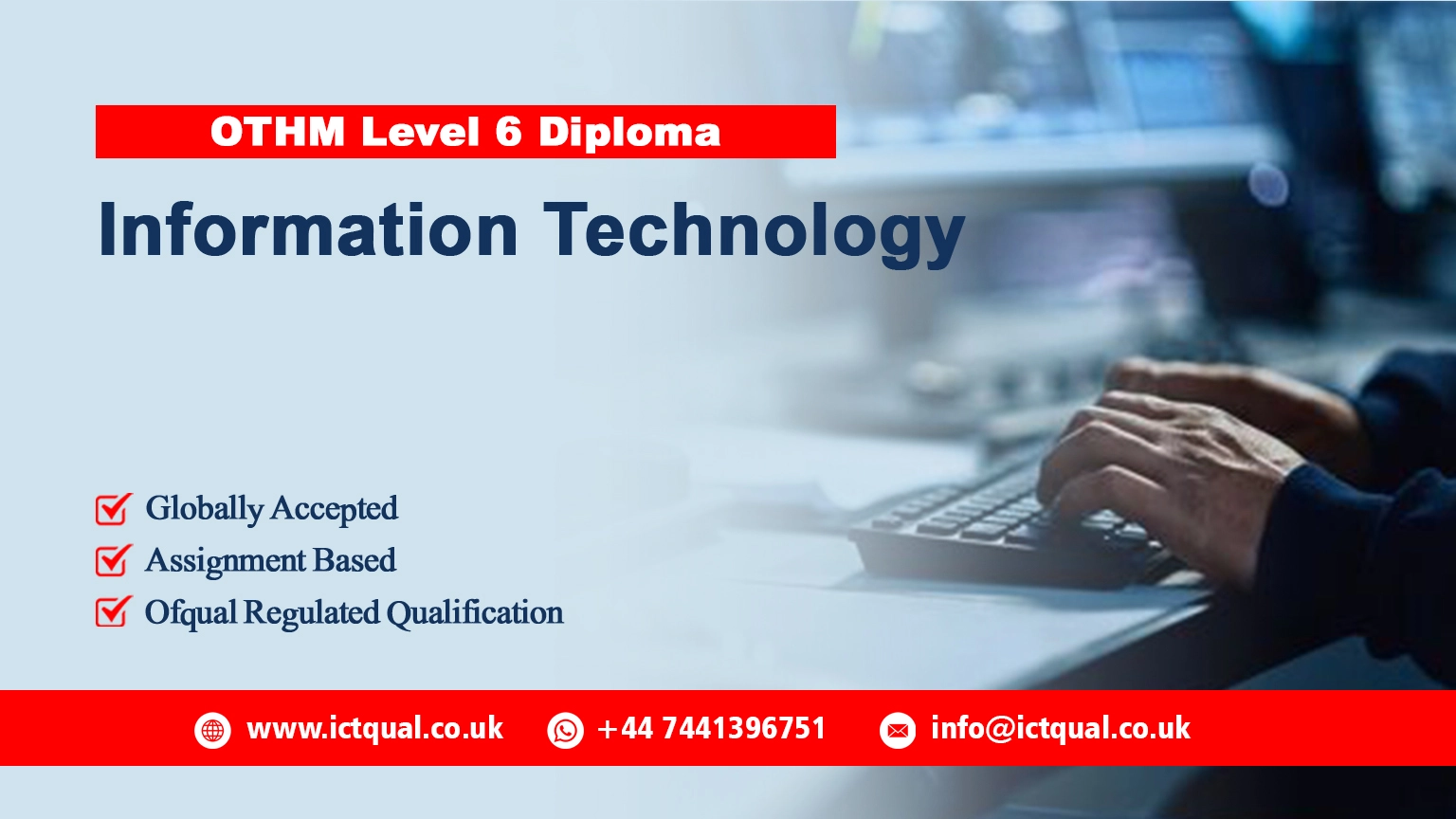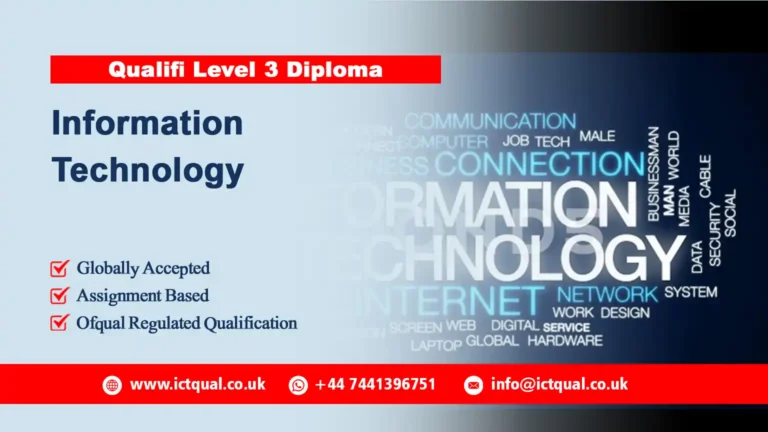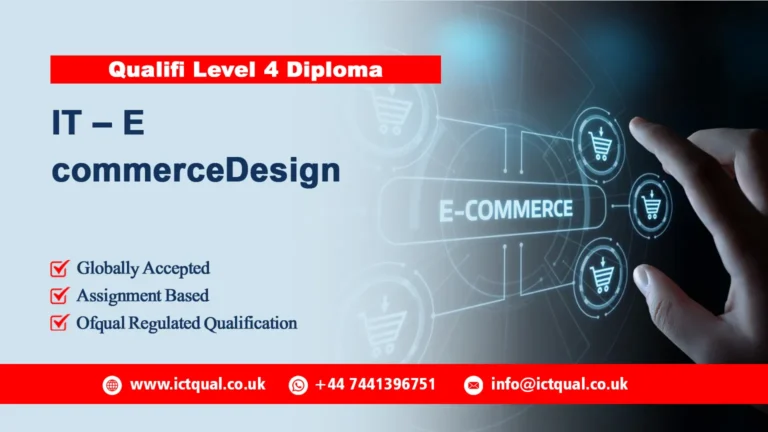Are you ready to seize the opportunity and take your passion for IT to new heights? Look no further than the prestigious OTHM Level 6 Diploma in Information Technology a pathway to your tech dreams!
With the OTHM Level 6 Diploma, you’ll embark on a thrilling journey into the heart of technology. From cybersecurity and data analytics to artificial intelligence and cloud computing, this diploma covers the latest trends and innovations shaping the digital landscape. Dive deep into cutting-edge technologies and discover your potential to revolutionize the way we live, work, and play.
Designed for aspiring IT professionals and seasoned experts alike, this diploma program offers a comprehensive curriculum that equips you with the skills and knowledge needed to excel in the digital age. Through hands-on projects, real-world scenarios, and expert guidance, you’ll hone your technical expertise, problem-solving abilities, and creative thinking skills setting the stage for a successful career in IT.
The world of technology is waiting for you. Seize the opportunity to unleash your potential and make your mark on the digital world. Enroll in the OTHM Level 6 Diploma in Information Technology today and embark on a journey of discovery, innovation, and endless possibilities. Your future in IT starts here—take the first step towards greatness!
he OTHM Level 6 Diploma in Information Technology is an extensive qualification meticulously crafted to furnish individuals with a profound understanding and proficient skills across diverse domains within the realm of information technology. This comprehensive diploma program encapsulates an extensive array of subjects, delving into pivotal areas such as software development, database management, networking, cybersecurity, and project management.
Through this program, participants are immersed in a dynamic learning environment where they not only acquire theoretical knowledge but also develop practical competencies essential for navigating the complexities of the IT landscape. By delving into topics ranging from software development methodologies to cybersecurity protocols, learners are equipped with the requisite expertise to design, develop, implement, and effectively manage IT systems to cater to the technological exigencies of modern organizations.
The curriculum is meticulously structured to strike a balance between theoretical foundations and hands-on applications, ensuring that learners gain a holistic understanding of IT principles while honing their practical skills. Whether it’s mastering the intricacies of database management or understanding the nuances of network architecture, participants are empowered to tackle multifaceted IT challenges head-on.
Moreover, as the digital landscape continues to evolve at a rapid pace, the OTHM Level 6 Diploma in Information Technology serves as a beacon of opportunity for individuals keen on making a significant impact in the tech sphere. Armed with a robust foundation in IT, graduates of this program are poised to spearhead technological innovations, drive organizational growth, and thrive in an ever-changing digital ecosystem.
So, are you ready to unlock your potential and become a trailblazer in the world of information technology? The OTHM Level 6 Diploma is your ticket to success. Join us on this exhilarating journey, where every line of code, every algorithm, and every innovation brings you one step closer to your goals. The future of tech awaits.
The OTHM Level 6 Diploma in Information Technology consists of 6 mandatory units for a combined total of 120 credits, 1200 hours Total Qualification Time (TQT) and 480 Guided Learning Hours (GLH) for the completed qualification.
| Sr# | Unit Title | Credit Hours |
|---|---|---|
| 1 | Advanced Computer Networks | 20 |
| 2 | Advanced Data Analytics | 20 |
| 3 | Advanced Database Management Systems | 20 |
| 4 | Management Information Systems | 20 |
| 5 | Computers, Society and Law | 20 |
| 6 | Computing Projects | 20 |
The OTHM Level 6 Diploma in Information Technology is tailor-made for individuals who are passionate about technology and eager to carve out a successful career in the dynamic field of IT. This course is ideal for:
- Tech Enthusiasts: Individuals with a keen interest in technology, including coding, programming, and software development, who are eager to deepen their understanding and expertise in IT.
- Career Changers: Professionals from diverse backgrounds who are looking to transition into the field of information technology and pursue new career opportunities in tech-related roles.
- IT Professionals Seeking Advancement: Seasoned IT professionals who want to upgrade their skills, stay current with industry trends, and enhance their career prospects in the rapidly evolving tech landscape.
- Recent Graduates: Graduates with a degree in computer science, information technology, or related fields who are seeking specialized training and practical experience to kick-start their careers in IT.
- Aspiring Entrepreneurs: Individuals with entrepreneurial aspirations who want to launch tech startups, develop innovative software solutions, or explore opportunities in the tech industry.
- IT Managers and Team Leaders: Managers and team leaders in IT departments who are looking to broaden their technical knowledge, leadership skills, and strategic capabilities to drive organizational growth and success.
- Anyone with a Passion for Problem-Solving: Individuals who thrive on solving complex problems, leveraging technology to create innovative solutions, and making a positive impact in the digital world.
Whether you’re a seasoned professional looking to advance your career or a newcomer eager to explore the exciting world of technology, the OTHM Level 6 Diploma in Information Technology offers the knowledge, skills, and opportunities you need to thrive in the fast-paced and ever-changing field of IT.
Here are the learning outcomes for the OTHM Level 6 Diploma in Information Technology:
- Advanced Programming Skills:
- Develop proficiency in programming languages such as Java, Python, C++, and JavaScript.
- Acquire the ability to design, develop, and debug complex software applications and systems.
- Cybersecurity Knowledge and Practices:
- Understand the principles of cybersecurity, including threat detection, prevention, and mitigation strategies.
- Learn to implement security measures to protect data, networks, and systems from cyber threats and vulnerabilities.
- Data Analytics and Management:
- Gain expertise in data analytics techniques, including data mining, data visualization, and predictive analytics.
- Learn to extract insights from large datasets and make data-driven decisions to drive business outcomes.
- Cloud Computing Fundamentals:
- Explore cloud computing concepts, architectures, and deployment models.
- Develop skills in building and managing cloud-based infrastructures and services using platforms such as Amazon Web Services (AWS), Microsoft Azure, and Google Cloud Platform (GCP).
- Artificial Intelligence and Machine Learning:
- Understand the fundamentals of artificial intelligence (AI) and machine learning (ML) algorithms and techniques.
- Apply AI and ML methodologies to solve real-world problems and enhance decision-making processes.
- Software Development Lifecycle (SDLC) Management:
- Learn the stages of the software development lifecycle, including requirements analysis, design, development, testing, deployment, and maintenance.
- Gain practical experience in project management methodologies such as Agile and Scrum to deliver high-quality software products on time and within budget.
- Networking and Infrastructure Management:
- Acquire knowledge of networking protocols, architectures, and technologies, including TCP/IP, LAN/WAN, and VPN.
- Develop skills in designing, implementing, and managing network infrastructures to ensure optimal performance and reliability.
- Ethical and Legal Considerations in IT:
- Understand the ethical and legal issues surrounding information technology, including privacy, intellectual property rights, and regulatory compliance.
- Learn to adhere to ethical standards and professional codes of conduct while working in the IT industry.
By mastering these learning outcomes, graduates of the OTHM Level 6 Diploma in Information Technology will be well-equipped to pursue a variety of career paths in software development, cybersecurity, data analytics, cloud computing, artificial intelligence, and beyond. They will possess the knowledge, skills, and confidence to thrive in today’s rapidly evolving technological landscape and make meaningful contributions to the digital world.
Register Now
Fee Structure for OTHM Level 6 Diploma in Information Technology
Future Progression
This Level 6 Diploma in Information Technology qualification has been developed with career progression and professional recognition in mind. Successful completion of this qualification provides learners the opportunity for a wide range of academic progressions.







